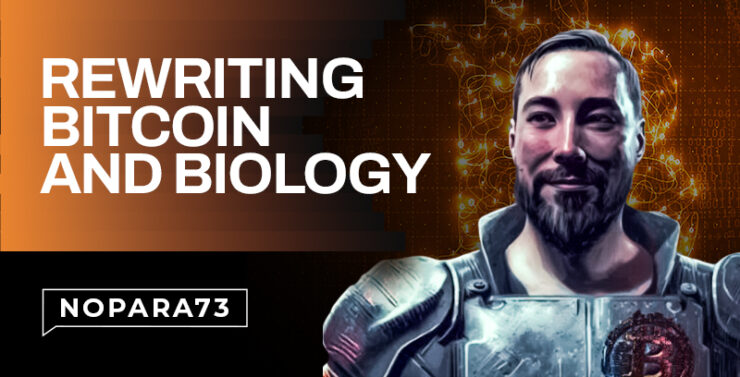There are builders in crypto, and then there are outliers—those who defy the industry’s gravity entirely. Few embody that outsider brilliance more than nopara73, the pseudonymous developer behind Wasabi Wallet, co-author of Programming Bitcoin, and now the founder of Longevity World Cup—a global sport designed to reverse aging.
Whether he’s optimizing for transaction anonymity or cellular rejuvenation, nopara73’s obsession is simple: reprogram the systems that define how we live, age, and stay free.
His Bitcoin origin story reads like hacker folklore. Young and directionless, he emailed Bitcoin developer Nicolas Dorier (of BTC Pay Server fame) asking to work for free. The response was instant—”Come to Japan.”
“I was young and it came at the right time. I had nothing better to do,” he recalled.
That email became the first step in a radical apprenticeship—coding alongside Dorier, rewriting entire libraries, and ultimately co-creating one of the most privacy-forward Bitcoin tools in history, as he revealed during his recent appearance on the Coinrock Show.
There was no roadmap—just obsession and immersion. While in Japan, nopara recreated Dorier’s C# Bitcoin tutorials line-by-line, but in his own words,
“in a way that even low-IQ individuals like me could understand.”
That exercise would become the basis for Programming Bitcoin, now a foundational manual for aspiring protocol engineers.
Wasabi Wallet and the Privacy Fight
Nopara73’s deeper calling emerged when he stumbled upon JoinMarket, an early Bitcoin privacy tool with no interface—just command-line chaos.
“And people were super excited about it,” he remembered.
“I’m like, what the heck is going on here? And that’s when I realized the demand for privacy”
This was his lightbulb moment. If people would tolerate complex tooling for privacy, what if he could make it accessible? The result: Wasabi Wallet, a sleek, user-friendly coinjoin wallet that allowed users to mix their transactions and reclaim financial anonymity.
Wasabi didn’t just push code—it challenged norms. At its peak, the wallet had 50 contributors, 20 developers, and a growing global community. Yet nopara’s own privacy principles remained unwavering.
“Not even the U.S. Secret Service found anything that they could take us to court for,” he said proudly, a reminder of how robust design can withstand legal scrutiny.
Aging as a Game
Then came the plot twist—a new frontier that no one expected. In a sharp pivot from cryptography to biology, nopara launched Longevity World Cup—a gamified global tournament where the objective is not to score goals, but to reduce your biological age.
The concept is audacious. Participants track biomarkers, implement cutting-edge anti-aging protocols, and compete to see who can turn back their body’s clock the most. It’s part science, part spectacle—and deeply personal.
“People have two fears that one is the fear of non-existence and the other is the events leading up to your own death. Yeah. Because chances are that’s not going to be pretty,” he explained.
“So the longevity world Cup is a unique, unique way of looking at this field. People are competing against each other who can reverse their biological age.”
Longevity World Cup is his defiant answer to death. It’s not a hedge—it’s a full-on assault. Just like Wasabi Wallet sought to outwit surveillance capitalism, this new venture challenges the finality of aging itself.
The CBDC Dilemma and Bitcoin’s Stall
Despite his history as a Bitcoin builder, nopara is refreshingly unromantic about the protocol’s trajectory.
“I must say I’m somewhat disappointed by the slowness of progress,” he said. Bitcoin’s adoption is rising, yes—but its core functionality hasn’t evolved fast enough, especially in areas like portability and privacy.
Still, he sees hope in what could be—even in Central Bank Digital Currencies (CBDCs), which he surprisingly doesn’t dismiss outright.
“In theory, a CBDC could be worth changing,” he admitted, noting that centralized architectures could technically offer perfect privacy if user control and custody were honored. But real-world implementations, like Chaum’s Elixir, often fall short—
“already having compromises like KYC,” he said.
“Even the legend himself couldn’t make it work.”
And while stablecoins are gaining steam, he sees them as incomplete.
“Let’s say they created the idea of money, but they still didn’t fix the problem of the criminals at the top. Okay, let’s not call them criminals. Let’s just call them like a group of people who can create money out of thin air. That’s what Bitcoin fixed.”
Legacy in Code, Purpose in Cells
In a world that often forces builders to choose one mission, one protocol, or one domain, nopara73 chose none of the above. Instead, he’s chosen purpose—whether that’s shielding transactions from lurking eyes or hacking biology to add more time to the clock.
His legacy isn’t tied to a GitHub repo or token price—it’s found in the audacity of his questions: What if wallets protected your identity by default? What if getting younger could be a global competition? What if money—and time—were ours to reclaim?
Where to Find nopara73
- X (Twitter): @nopara73
- Project: Wasabi Wallet
- New Venture: Longevity World Cup
- YouTube: Nopara73





